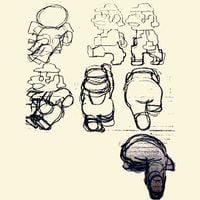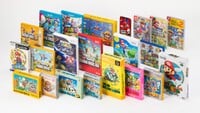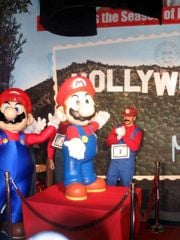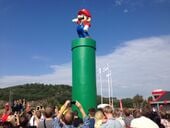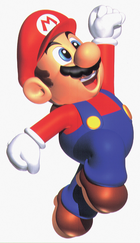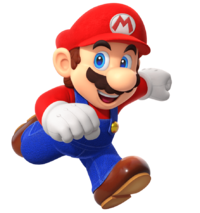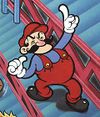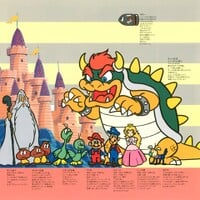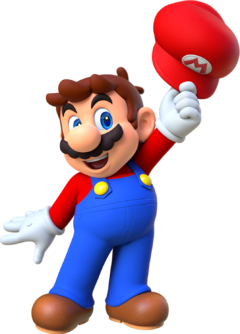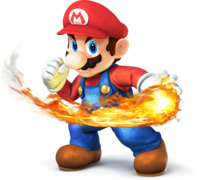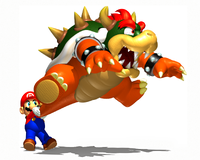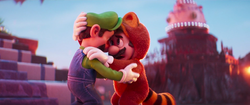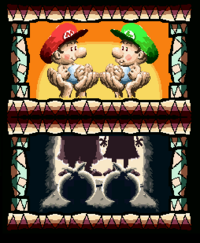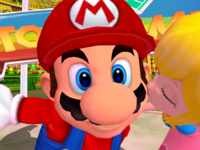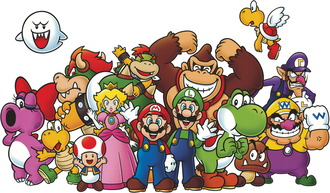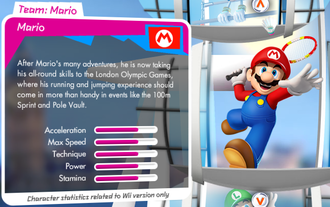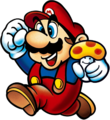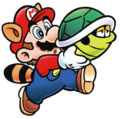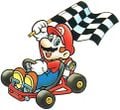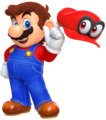Mario
- This article is about Mario, the main character of the namesake franchise. For the overall franchise, see Super Mario (franchise). For the portrayal of Mario in the 1993 Super Mario Bros. film, see Mario (film character). For his infant counterpart, see Baby Mario.
- "Jumpman" redirects here. For the badge of the same name, see Jumpman (badge). For the Donkey Kong minigame from Mario Party 7, see Jump, Man.
| Mario | |
|---|---|
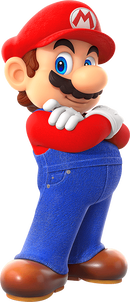 Artwork from Mario vs. Donkey Kong for the Nintendo Switch | |
| Full name | Mario Mario[1] |
| Species | Human |
| First appearance | Donkey Kong (1981) |
| Latest appearance | Paper Mario: The Thousand-Year Door (Nintendo Switch) (2024) |
| Latest portrayal | Kevin Afghani (2023–present) Charles Martinet (1993–2022, 2024) |
- “It's-a me, Mario!”
- —Mario, Super Mario 64
Mario is the main character and titular protagonist of the long-running and highly successful Super Mario franchise. He was created by Japanese video game designer Shigeru Miyamoto and serves as the main mascot of Nintendo. Mario made his first appearance as the protagonist of the arcade game Donkey Kong, released in 1981 (in which he took the alias "Jumpman"). Since Super Mario Bros., his trademark abilities have been his jumping and stomping powers, with which he defeats most of his enemies, and his ability to gain even more powers with a plethora of items, such as the Super Mushroom, the Fire Flower, and the Super Star. Games have usually portrayed Mario as a silent, straightforward character. According to Nintendo's philosophy, this allows Mario to fit in many different genres and roles. In most games, he is the hero who goes on an adventure to save Princess Peach from his arch-nemesis, Bowser, but he has been shown doing many other activities besides adventuring, such as racing and sporting with his younger but taller twin brother, Luigi; his friends such as Yoshi and Toad; and others.
Creation
Following the failure of Radar Scope in North America, Nintendo's then-president, Hiroshi Yamauchi, requested designer Shigeru Miyamoto's aid in converting unsold Radar Scope units into something that would sell well. Miyamoto conceived the concept of a love triangle and decided to make a game based on Popeye. This was abandoned due to technical reasons, so he decided to come up with a new idea using his own characters.[2]
For use in his arcade game Donkey Kong, Miyamoto created a player character originally known during development as Ossan (the Japanese term for "middle-aged man," which coincidentally would be the name given to a Mario look-alike in the game Golf), then Mr. Video Game or Mr. Video and Jumpman.[3][4] This character was given red overalls and a blue shirt in order to make the arms more visible as well as a cap and mustache, as hair and a mouth were impossible to animate on the arcade system.[5] When the game was released in Japan, he was simply a nameless "player" (プレイヤー) in the Japanese arcade instructions and flyer. In the American arcade instructions, he was called Jumpman, but Nintendo of Japan asked Nintendo of America if it wanted to rename him during the Western localization. President Minoru Arakawa and warehouse manager Don James thought it would be funny to call the character Mario after the reclusive Italian American landlord of storage and company housing, Mario Segale.[6][7][8][9] It was too late to replace the Jumpman name from the instructions, but the "Mario" name appeared on the Template:Media link that debuted alongside the game. In Japan, he became known as Mario with the release of Donkey Kong Jr. Prior to this, the Japanese instructions for the Game & Watch version of Donkey Kong called him Kyūjo Man (救助マン, lit. "rescue man").
While Mario was initially described as a carpenter, Mario Bros. subsequently changed his occupation to a plumber because "the scenario dictates his role."[10] Miyamoto in a 2009 radio interview stated that he wanted to create a hero resembling an "ordinary odd-job man"; he did not like the idea of a perfect hero, preferring the idea of "ordinary citizens doing something really good for society," and would be "embarrassed" for making a perfect hero. He stated, "I like the idea of a middle-aged ordinary man doing something nice for other people."[11]
History
- Main article: History of Mario
Due to being a recurring major protagonist of a long-running video game series, Mario has an extensive history spanning decades and across various media from video games to TV shows to comics and even full-length featured films. Although his history does not follow a clearly established canon, some of Mario's earliest games chronologically are in the Yoshi's Island series, depicting Mario's birth as part of a twin delivery, with Luigi, by a stork. Sometimes, Mario has even interacted with his baby self, especially in Mario & Luigi: Partners in Time. While most of Mario's adventures are told in straightforward narratives that involve rescuing Princess Peach from Bowser, various RPGs, comics, and animated films, including some Paper Mario and Mario & Luigi games, involve a more extensive plot, sometimes with Mario even allying with Bowser to defeat a greater villain. Mario has also been involved in some crossovers, including with other Nintendo properties in the Super Smash Bros. series, Sonic the Hedgehog in the Mario & Sonic series, Dragon Quest in Itadaki Street DS and Fortune Street, and Rabbids in the Mario + Rabbids series. Mario's history also includes some appearances outside his own series, usually cameos.
Cultural impact
- Main article: Super Mario (franchise) § Reception and legacy
Mario is often said to be the most famous video game character in history. A Q Score survey made in the early 1990s showed Mario was even more popular than Mickey Mouse,[12] and Mario has the only wax statue of a video game character, which stands in the Hollywood Wax Museum.
The Super Mario franchise is the best-selling video game franchise in history; the sales include 528.534 million, whereas the second-best-selling franchise, Pokémon, totals 300 million.[13] Even with spinoff series excluded, the main Super Mario franchise has sold 311.46 million games (as of September 2015).[14] Furthermore, Super Mario is the flagship franchise of Nintendo, and Mario is the company's mascot, furthering his publicity even more. According to Guinness World Records 2008: Gamer's Edition, Mario has appeared in a total of 116 separate games, which is more than any other video game character,[15] and more recent sources such as the Game On 2.0 traveling exhibit place the number at over 200.[16]
General information
Physical description
Mario's distinctive look is due to technology restrictions in the mid-1980s, particularly Nintendo's inability to depict Popeye. With a limited number of pixels and colors, the game developers, including Mario's creator, Shigeru Miyamoto, could not animate Mario's movement without making his arms "disappear" if his shirt was a solid color, so they gave Mario overalls. The developers additionally did not have the space to give him a mouth, the result of Mario's mustache. Mario has a big nose to have his face read better in the limited pixel space. Mario was made stocky so he covers best in the space he was allocated in. Finally, the developers used a cap to bypass the problem of animating and drawing hair. Mario's gloves were a later addition by the artist Zavier Leslie Cabarga for the North American poster for Donkey Kong.[17]
Mario has undergone major changes since his initial appearance in Donkey Kong up until Super Mario Bros. 3. In Donkey Kong, Mario initially appears lankier with a more realistic-looking red nose and a cleft chin. In some portrayals in Donkey Kong Jr., however, he appears stouter with a round nose, which resembles more closely to Mario's current design, although some promotional art retains his original Donkey Kong design. The stubbier design is retained in Mario Bros., with a few changes. Super Mario Bros. marks the first time he has blue eyes, full hair, a red cap with an insignia, a distinct mustache, a large round nose, large hands, and other features. It would not be until Super Mario Bros. 3 where his modern design would debut; he would become notably taller and skinnier, and his overalls and shirt would be reversed in color. However, due to color limitations at the time, his in-game design did not fully match the artwork, such as having black hair like his mustache instead of brown, white overall buttons instead of yellow ones in Super Mario World, and hair that had a more reddish-brown color and was not very defined in shape below his hat in Super Mario 64. Before Super Mario Bros. 2, the colors of his shirt and overalls were reversed until Super Mario World and the remade sprites of Super Mario All-Stars, and he also did not wear his gloves. His neck is very short and barely visible due to his round and slightly disproportionate head compared to the rest of his body and the position of his chin.
Though Mario was originally imagined as middle-aged, his changes in design made him noticeably younger, and his age has been approximated to be about 26 years old,[18] while Miyamoto later placed it at either 24 or 25.[19] The pamphlet for Super Mario Bros.: Peach-hime Kyūshutsu Dai Sakusen! estimates Mario's age at around 25. The comic Mario vs. Wario also implies Mario (and Wario) is roughly in his late 20s or early 30s, as he recalls his childhood 20 years ago.
While Mario is consistently portrayed as a short character, his precise height and proportions vary across media, without a specified height from most video game material. An Amazon listing for a figure of Mario that is marketed as "life-size" lists its height as 150 cm (4 ft 11 in.) tall.[20] The pamphlet for Super Mario Bros.: Peach-hime Kyūshutsu Dai Sakusen! gives his height as 150 cm and weight as 70 kg (154 lbs.) Crossover artwork featuring Mario and Sonic the Hedgehog (who stands at 1 m / 3 ft 3 in.) shows Mario at around the same height as him, if not two or three inches shorter due to Sonic's quills. Mario's height relationship with other humans has been varied. Some media, such as Super Mario Odyssey and Mario's Time Machine, show Mario as much shorter than a realistic human, while others, including Mario Golf and the DIC cartoons, show Mario's height closer relative to other humans. The director of Super Mario Odyssey, Kenta Motokura, stated in an interview that New Donk City was realistic to showcase the extent of Mario's abilities in a realistic environment for a scale that is easy to understand,[21] while Miyamoto referred to the humans of New Donk City as "normal people."[22]
Merchandise for the original Donkey Kong showed Mario as balding, although most media depict Mario with a full set of hair. He has short chocolate brown hair with three front locks, four back locks, and a sprout-shaped cowlick on the top of his head. The most notable change Mario has received over the years since Super Mario Bros. (omitting stylistic variations such as depictions in Paper Mario) is his change in stature; Mario is shown to be much stubbier in his earlier appearances compared to his more recent appearances, starting with Super Mario 64. Mario's legs and arms have grown longer over the years, giving him a slimmer look. This may have been the result of Miyamoto's response to Mario's and Luigi's "cute" appearances, and he considered redesigning the Mario Bros. to "become a bit more grown-up" in the GameCube era—for instance, by removing their trademark V sign.[23]
Mario's most prolific early 3D iteration is from Super Mario 64, where he and other characters were created from Silicon Graphics workstations. Mario is depicted with darker blue overalls and bigger eyes than in his current appearance based on the one in Luigi's Mansion. He has slightly darker skin, his ears are also rounder, his overall straps are longer, and his cap is less round. Ever since Luigi's Mansion, however, Mario has received only minor proportion changes to his general appearance, becoming taller and slimmer, though still chubby and with brighter colors on his clothes, skin, and hair; pockets on his overalls; and added detail in his shoes, eyes, hat, and clothes in 3D artwork since Super Mario 3D World. While he always has a fair complexion, the tone of his skin has become inconsistent over the course of the more recent games, sometimes taking on a peach tone like in the more recent artwork, including the updated versions of the existing ones, and at times not.
Mario has a few stylistic variations across some games, sometimes within a series. One variation is Mario's overall appearance in the Paper Mario games: It is generally the same, with black dots for eyes and no eyebrows, although he has a shorter stature. Since Paper Mario: The Thousand-Year Door, however, Mario's body is more simplistic, with legless feet, a rounder face, and a full outline around the arms, while his mustache became brown like his hair. In addition, starting with Mario & Luigi: Paper Jam, all of Mario's paper appearances have depicted him with a white outline around his entire body. Another variation is Mario's depiction in the Mario & Luigi games, although it is more subtle, where Mario is given black eyes rather than blue, and in artwork for all games in the series except for Mario & Luigi: Dream Team, Mario is shown with a brown mustache instead of black. The artwork for the series also shows Mario with a serious or neutral expression that never leaves his mouth visible, unlike Luigi, who is shown with a larger variety of expressions.
The Super Smash Bros. series also has Mario's appearance change between games. In the original Super Smash Bros., Mario's appearance is derived from Super Mario 64 but with minor alterations, such as a slimmer appearance. In Super Smash Bros. Melee, Mario's design incorporates elements from Mario Kart 64 and Super Mario World, as well as official artwork from the Nintendo 64 era. Mario's hair and clothing are darker and have more detail in them, with his overalls particularly sporting back pockets and having denim textures, similar to his sprite in Super Mario World, and his skin having a more original tan complexion. In Super Smash Bros. Brawl, Mario's back pockets return, but his overall design is updated to resemble his appearances in Super Mario Sunshine and later games. However, Mario's color scheme is darker than before, while his hair and clothing have more realistic detailing. In Super Smash Bros. for Nintendo 3DS / Wii U, Mario's design is slimmer and more vibrant, matching his appearances in games such as Super Mario 3D Land, Mario Kart 7, Super Mario 3D World, and Mario Kart 8. As an accompaniment, Mario's hair and clothing have much less detailing. In Super Smash Bros. Ultimate, Mario's design is mostly the same, aside from a more subdued color scheme and simple detailing in his hair and clothing, but not to the same extent as Melee and Brawl. Super Mario Odyssey has realistic details on his hair and overalls, and some other games also retain the realistic details to an extent.
According to the Insiders' Calendar included in the second issue of Nintendo Power, Mario's birthday is October 11.[24][25]
Clothing
Mario is typically shown wearing his trademark outfit wherever he goes. He has a long-sleeved red shirt, which is tucked under a pair of white gloves and has a noticeable collar at the neck. He also wears blue overalls with yellow buttons layered over his shirt. His light-brown work shoes are referred to as boots in the Paper Mario series, and they are shown to have a rim on the top, although Mario's shoes in most media do not have this rim.
Originally, Mario wore red overalls on top of a blue shirt—nearly the opposite colors of what he wears now. The Famicom version of Mario Bros. is the first game to depict Mario with blue overalls and a red undershirt (although on the box art, he is depicted entirely in blue), but Super Mario Bros. 2 standardized Mario's current colors.
Mario's trademark is his red cap with his red M insignia. Mario's cap is sometimes an important and even mandatory accessory in some games, such as Super Mario 64, where he takes more damage without his cap. In Super Mario Sunshine, if Mario loses his cap, he acquires damage over time from the heat of the sun. In most media, however, Mario's cap is treated as a mere accessory, and Mario can go capless in some games without any additional effect, such as in New Super Mario Bros. Wii after obtaining 99 lives. In some games, such as Super Mario 3D Land, if Mario is in Small form, he is seen without his cap, although it is no different from the other incarnations of the Small form. In Super Mario Odyssey, Mario's default cap is replaced with Cappy, which can be replaced with other hats in the Crazy Cap stores as well. Additionally, Mario has over 40 outfits available to wear, which can range from recolors to resemble Luigi, Wario, or Waluigi to unique outfits that see Mario dressed as a pirate, as an astronaut, as a knight, as a musician, in swim attire, or even as Princess Peach in her wedding gown.
Although mostly seen with his default plumber attire, Mario has also worn several alternate outfits in the spinoff games, including but not limited to Mario Party games, Dr. Mario, NES Open Tournament Golf, Mario's Picross, the Mario Strikers games, Mario & Sonic at the Olympic Games Tokyo 2020, and Mario Golf: Super Rush. In Mario & Sonic at the Olympic Games Tokyo 2020, Mario wears different outfits depending on the sport or activity being played. In some sports, Mario wears the same red sneakers he originally wore in Mario Tennis Aces.
Mario has seen some variations to his outfit in the games. In Super Mario Sunshine, for instance, Mario has shorter sleeves. In addition, Mario can wear a tropical shirt over his normal shirt, along with sunglasses that darken the screen, if he talks to the Sunglasses vendor. Mario also usually gains alternate outfits when using power-ups, from simple recolors to covering his whole body, such as Fire Mario, Tanooki Mario, Propeller Mario, Flying Squirrel Mario, and Cat Mario. Finally, Mario can resemble different characters, even outside the Super Mario franchise, by using a Mystery Mushroom to change into one of the various forms of Costume Mario in Super Mario Maker.
Within the Super Smash Bros. series, Mario has several alternate colors to use, with two costumes in Super Smash Bros. Ultimate, most referencing existing characters throughout the Super Mario franchise.
Name
Mario's family name is given as "Mario" in the live-action segments "Dance" and "Treasure of the Sierra Brooklyn" of The Super Mario Bros. Super Show! and made popular in the live-action movie Super Mario Bros. This occasionally occurs in other media—for instance, the Prima guidebook for Mario Party 2 lists his name as Mario Mario in a note section,[26] and the Prima guide for Mario & Luigi: Superstar Saga similarly shows Mario's full name as Mario Mario in the list of major characters.[27] The arcade flyers for Donkey Kong/Donkey Kong Jr./Mario Bros. use the full name as well. Also, when people asked Mario (voiced by Charles Martinet) on MIRT what his last name was at San Diego Comic-Con 2012, he responded with this: "What's my last name? Ah, that's a very good question! ... That's right! It's-a Mario. My name-a Mario Mario. Of course, my brother name, a-Luigi Mario. And of course, my mama's-a Mama Mia Mario; my papa Papa Pio Mario. Of course, my grandmama Grandmama Mia Mario, and my grandpapa Grandpa—et cetera, et cetera. Yeah, first name Mario, last name-a Mario. Yahoo!"[28] However, Nintendo of America earlier claimed that "there are no last names."[29] This was later stated by Nintendo president Satoru Iwata.[4] Additionally, Shigeru Miyamoto previously stated that Mario and Luigi do not have last names, contrary to their depiction in the movie, although he later redacted that stance, confirming at the Super Mario Bros. 30th Anniversary festival in September 2015 that Mario's and Luigi's last names are indeed "Mario."[1]
Personality
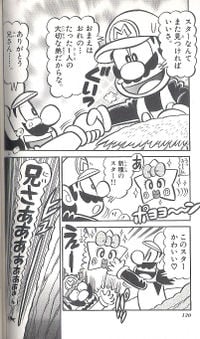
- “One of the things that's interesting about Mario is that there's very little character to him. You know very little about him. So despite the fact that he's incredibly well-known, incredibly visible and recognized, we know very little about his backstory, his history, or his motivations, so he's not much of a character in the traditional film or TV sense.”
- —James Newman, senior lecturer of cultural studies of Bath Spa University, 2009 radio interview[11]
Mario is a heroic Italian plumber, with media outside the games depicting him from Brooklyn. Mario is known for being kind, cheerful, playful, encouraging, courageous, and headstrong, and he is also eager and cocky on certain occasions. Officially, however, Nintendo producers have stated that Mario's biography is kept simple in order to make the character versatile and reusable in many different games and situations.[30]
Mario loves food, especially Italian food, which is most notably seen in the DIC cartoon trilogy but is also shown in the games such as in Super Mario 64 and Super Mario Odyssey, where he dreams about Italian food; Super Mario Sunshine, where he is attracted to the promise of seafood, remarks balefully that the disturbed Delfino Airstrip resembles a "giant, empty plate," and frets that he is going to miss dinner;[31] Luigi's Mansion 3, where Mario is drawn to a food display in the Grand Lobby; and Fortune Street, where he offers Yoshi to help look for cookies before suggesting that he has already eaten the cookies ("just give me a second to brush these cookie crumbs out of my mustache!"). Mario is pickier in The Super Mario Bros. Movie, however, showing his disgust at mushrooms. Characters also occasionally suggest he pay attention to his diet, such as Hoot from Super Mario 64 and the Star Temple gate from Mario & Luigi: Partners in Time.
Mario, although competitive, shows generally good sportsmanship, even complimenting his opponents, as shown in instances such as Mario Kart 8 (there is a chance he says, "Good play!" when he is in second to sixth place) and Fortune Street (see his various losing quotes). He still shows disappointment when he loses, however, such as wiping a tear in Mario Kart 64. He is occasionally visibly frustrated but restrained, such as when he throws a small fit when he gets a double bogey or worse in Mario Golf: Toadstool Tour, exhales to contain his anger in Mario Strikers Charged, and stomps his foot in frustration before sitting in resignation in all console entries for the Mario Party series starting with Mario Party 10.
Mario has occasionally shown assertive tendencies throughout his appearances, albeit in a lighthearted and comic-relief manner. In Super Mario RPG: Legend of the Seven Stars, Mallow had to physically restrain Mario from charging in, such as before the battle with Bowyer, so that the heroes can figure out what is happening to their surroundings.
There is also several one-off miscellaneous information. The 1993 Nintendo Character Manual, for instance, has stated that Mario loves animals, especially the most unusual ones,[32] and he also enjoys music, particularly opera or new-wave Europop,[32] although there is no further comment for these statements. Mario Strikers Charged gives Mario a rock-'n'-roll theme for his entrance and scoring animations and an orchestrated theme for his Super Ability. Finally, game art and gameplay depict Mario playing the saxophone.[33][34][35] Mario is also said to be an avid All Night Nippon listener.[36]
Speech
Mario did not speak in any games from the 1980s to the early 1990s due to each system not having the required storage to fit voice clips without compromising graphical fidelity. Despite the increase of storage, Mario was still not given voice-acting on the Super Nintendo Entertainment System. The MS-DOS version of Mario Teaches Typing was the first game to introduce voice acting for Mario, while the CD-ROM version was the first to feature voice acting by Charles Martinet.
Since then, like many other protagonists of Nintendo games, Mario has rarely spoken in full sentences in most of the mainline video games, usually making him a semi-silent protagonist. In early games, however, Mario fully speaks for long periods of time, such as in Mario's Game Gallery and Mario Teaches Typing 2. In the Japanese version of Super Mario Sunshine, which retains the English voice acting, Mario (Charles Martinet) speaks full sentences and holds a full conversation with Toadsworth (Scott Burns) in the cutscenes.[37] Mario, when voiced in the games by Martinet and later Kevin Afghani, speaks sometimes broken English with a heavy Italian accent and in a soft, high-pitched voice, often referring to himself in the third person as illeism. When he screams or is happy or excited, his voice tends to go falsetto. There are some games where Mario has also been given complete dialogue bubbles, such as Itadaki Street DS and Fortune Street. Mario has also spoken in full sentences in various promotional events, such as the 2006 interview for New Super Mario Bros.,[38] a press conference released for Mario Sports Mix, the Nintendo 3DS system demonstration,[39] and Play Nintendo's series Mario Reads Your Letters. In promotional venues with MIRT, people can communicate with Mario by asking various questions; there, too, Mario speaks for long periods of time.[28][40][41] In The Cat Mario Show, Mario can speak fully, but he has an entirely different voice. After the GameCube era, Martinet made a slight change to the way he voices Mario, using his tenor voice more consistently and taking on a slightly lower pitch to make him more expressive, while in the Super Smash Bros. games from Super Smash Bros. Brawl onwards, Mario's voice became deeper and raspier than usual, similarly to Super Mario Galaxy. In Super Mario 3D World, as well as various games from the Nintendo Switch era (including Super Mario Odyssey and Luigi's Mansion 3), Mario's voice has become noticeably deeper and slightly weaker in energy due to Martinet aging. In Super Mario Bros. Wonder, after Martinet stopped voicing Mario, Afghani succeeded him and gave Mario a similar but higher-pitched voice.
Most non-game media, such as comics, manga, anime films, and cartoons, also show Mario speaking. In the cartoons and The Super Mario Bros. Movie, Mario is usually associated with a Brooklyn accent, the former with a gruff voice. Mario speaks in the various anime films and shorts such as in Super Mario Bros.: Peach-hime Kyūshutsu Dai Sakusen!, though his voice is not as gruff as in the cartoons.
Likewise, in some cases, Mario is a true silent protagonist, or he does not speak in English. In Super Mario RPG: Legend of the Seven Stars, Mario is completely silent, communicating solely through pantomime. In the Paper Mario titles, he mainly communicates through simple nodding and hand gestures; while he is completely silent in Paper Mario, however, he is given his usual voice in Paper Mario: The Thousand-Year Door and Super Paper Mario. Mario is also silent during dialogue scenes in the Mario Baseball series, Mario Tennis Aces, the Mario Golf series, and the Mario & Sonic series, although he does say the usual catchphrases in a game session. In these games, other characters speak for him, mainly Lakitu and Toad. In the Mario & Luigi titles, Mario and Luigi speak in unintelligible Italian-sounding gibberish that the other characters can understand.
| File info 0:11 |
Powers and abilities
Mario's primary ability is his jump, which he relies on to defeat enemies, avoid hazards, and activate helpful items, such as ? Blocks and P Switches. Although Luigi jumps higher, Mario is more well-known. Mario is also agile, capable of several acrobatic maneuvers, including the Long Jump, Backward Somersault, Spin Jump, and Wall Jump, with the Wall Jump being one of his most recurring abilities. Several of these abilities are later shared with other Super Mario characters. Some games depict Mario as immune to fall damage, such as in Super Mario Galaxy and Super Mario Odyssey, though landing still impacts him, while other games such as Super Mario 64 have him taking damage; Mario can be instantly defeated by falling great heights in the Donkey Kong games. While Mario usually jumps for his attack, he can punch and kick in a few other games such as Super Mario 64, the Mario Party series, and the Super Smash Bros. series.
Mario's main weapon is the hammer in Donkey Kong, although Mario often also uses the hammer as a weapon in Super Mario RPGs. Mario is usually associated with fire in the spinoffs, based on his Fire Mario form from Super Mario Bros. Mario can, in some games, such as Super Mario RPG: Legend of the Seven Stars, control fire without a Fire Flower, although the first game where he actually starts using this power regularly is Super Smash Bros. Melee.
Mario can carry objects much larger than himself in some games. In Super Mario 64, he can carry and throw the Big Bob-omb, although with some difficulty. During the battles with Bowser, Mario can grab him by the tail, spin him, and throw him. His strength is also shown in Super Mario Galaxy, where he can easily stun a Grand Goomba with a Star-Spin despite its great size and can knock Bowser around during battles with him. In Mario & Luigi: Bowser's Inside Story, although Mario is visibly straining, he is able to lift and throw a swollen Luigi when using the Snack Basket move. In the spinoffs, Mario, although usually balanced, boasts generally slightly above-average power, and in golf, he has one of the strongest drives.
Mario has been designed to be a versatile character. As a result, his abilities reflect a balanced playstyle, allowing him to participate and perform well in many situations. Indeed, his bios have frequently and consistently described him as a "jack of all trades." Another result of his versatility is the number of occupations he holds.
Mario can also take advantage of several power-ups and transformations.
- Mario has fourteen power-ups that allow him to fly: the Wing, the Super Leaf, the Tanooki Suit, the P-Wing, the Cape Feather, the Power Balloon, the Wing Cap, the Power Flower, the Bee Mushroom, the Boo Mushroom, the Red Star, the Propeller Mushroom, the Invincibility Leaf, and the Super Acorn. On The Super Mario Bros. Super Show!, Fire Mario can fly.
- Various games also allow Mario to grow to enormous sizes, sometimes with the help of the Mega Mushroom or a Super Mushroom. Mario's taunt in Super Smash Bros. has him posing and temporarily growing and shrinking. Growing large is sometimes Mario's special trait such as in Mario Super Sluggers (Enlarge) and Mario Strikers Charged (Super Mario! Super Ability).
- In Super Mario Bros. 3, Mario can transform into a Hammer Brother with the ability to throw hammers at his enemies, or he can transform into a frog with the ability to swim faster and jump higher.
- Mario has three other caps he can wear: the Metal Cap, Wing Cap, and Vanish Cap. These turn him into a metal form, allow him to fly, and make him invisible and intangible, respectively.
- In Paper Mario: The Thousand-Year Door, Mario becomes more paper-like and can become Flat Mario, Paper Tube Mario, Paper Airplane Mario, and Paper Boat Mario as a result of the "curses" cast upon him by the Black Chest Demons.
- In Super Paper Mario, Mario can temporarily flip between dimensions.
- In Super Mario World, Mario has the ability to run up walls and pipes.
- In Super Mario Odyssey, Mario can throw Cappy to "capture" sentient creatures and objects such as Goombas, Chain Chomps, Hammer Bros., and Bullet Bills, allowing him to control them.
Occupations
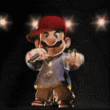
Despite starting as a carpenter in Donkey Kong, Mario is best known for being a plumber since Mario Bros. However, though he still frequently traversed through pipes, subsequent games rarely portray Mario as being directly involved in plumbing. Exceptions include him and Luigi repairing the plumbing of Beanbean Castle Sewer in Superstar Saga and repairing a Clear Pipe in the intro to Super Mario 3D World.
Other media, such as The Super Mario Bros. Super Show! and The Super Mario Bros. Movie, put a much bigger emphasis on Mario's job. According to the live-action segments in The Super Mario Bros. Super Show!, Mario works a menial job at Mario Brothers Plumbing in Brooklyn, just barely able to make enough money, and sometimes complains about a dull life. Despite this, he and Luigi seem to excel at their jobs, as it is stated that they have one of the best plumbing in New York City. Also, according to the show, Mario received his plumber training from the Brooklyn Plumbers Academy, founded by Salvador Drainotto, to whom Mario holds great respect. Mario is also skilled with various plumbing tools throughout the show's episodes, such as the All Purpose Portable Plumber's Helper and Plumber's Putty, which he uses to assist him and his friends in some hazardous situations. In 2016, a bio on the Kids section of the Nintendo Co., Ltd. site indicates that plumbing was Mario's former occupation; the bio on Mario Portal reconfirmed this.[42] However, as of March 2018, the Japanese profile was updated to state that Mario is still a plumber,[43] and that statement is further confirmed by Super Mario Bros. Wonder.[44]
In addition to plumbing, Mario has dabbled in various other occupations. One of his most notable recurring alternate careers is in medicine, as his alter-ego Dr. Mario, who stars in an entire spinoff series and is even a separate character in the Super Smash Bros. games (even though Mario and Dr. Mario are the same person). Mario is also known for his participation in a wide variety of spinoff sports games, including but not limited to golf, tennis, basketball, hockey, soccer, and both kart and motocross racing. He also participates in a wide array of Olympic events and has even made a cameo as a referee in Mike Tyson's Punch-Out!! Another series-specific recurring role Mario takes is as the president of the Mario Toy Company in the Mario vs. Donkey Kong games.
In addition to these, Mario has also had numerous one-off jobs, again including but not limited to a demolition worker in Wrecking Crew, an archaeologist in Mario's Picross, a baker in Yoshi's Cookie, a factory worker in Mario's Cement Factory and Mario Bros. for the Game & Watch, a soldier who delivers bombs in Mario's Bombs Away, a grocery worker in Super Mario Bros.: Peach-hime Kyūshutsu Dai Sakusen!, a psychotherapist in Super Mario Adventures (albeit as a gag), and potentially a sensei in Super Mario RPG: Legend of the Seven Stars. Finally, Super Mario Bros. & Friends: When I Grow Up depicts Mario in various occupations, intending to educate children on several careers they can explore.
Relationships
Family
- Main article: Mario and Luigi's family
- “I'm telling you, nothing can hurt us as long as we're together!”
- —Mario before he and Luigi get separated, The Super Mario Bros. Movie
Luigi is Mario's younger but taller twin brother. Luigi often joins Mario on his adventures, and the two are normally paired in sports titles and spinoffs. They share a strong brotherly bond ever since they were babies, and Mario has always shown protective instincts towards Luigi, as in the Yoshi's Island series, he can sense Luigi's location and leads the Yoshis to rescue him. Even after they became adults, they still live together and remain very close and committed to each other, such as in Luigi's Mansion, the Mario & Luigi series, and The Super Mario Bros. Movie. Mario also is shown to be proud of Luigi when he faces his fears for him, such as when Luigi fights King Boo on three different occasions to rescue Mario, and when Mario is saved in Luigi's Mansion 3, he is very happy that Luigi came to free him, and congratulates him before jumping in his arms and giving him a big hug. The 1993 official Nintendo Character Manual states that Mario, when he retires, plans to give his plumbing business to Luigi (while also implying a distinct age contrast, which conflicts with the idea that they are twins).[32]
While Mario and Luigi love each other, in Paper Mario, Luigi admits that he also feels jealousy towards Mario at times and has also expressed that he is "tired of being Player 2," for, despite being a hero in his own right, he is often overshadowed by Mario. While Mario teases that Luigi's quote of being Player 2 is taken out of context, adding that "Luigi loves being [his] sidekick" in the Mario Sports Mix press conference, in Mario & Luigi: Bowser's Inside Story, he is quick to give Luigi proper credit for defeating the Shroobs in the previous game. At times, Mario does compete with Luigi, such as when he intentionally steps and squirms on Luigi's foot when Luigi receives a trophy in Mario Power Tennis, making him uneasy and embarrassed. Despite this and his tendency not to receive the same credit as Mario, Luigi has always admired him and shown a strong loyalty to him that pushes him to face his fears if he needs his help. Mario & Luigi: Dream Team also shows his subconscious, known as Dream's Deep, where he has nothing but positive feelings and thoughts about Mario. Several pieces of artwork also show them posing together, with a few more and an animated sticker showing them giving each other a high-five.
In the LEGO Super Mario line, if Mario is woken up after being left asleep for a while, he calls out to Luigi looking worried. He can connect to Bluetooth with Luigi, allowing them to interact with each other. If Luigi is knocked down, gets dizzy from being shaken too much, is incapacitated by excessive damage from lava, or gets poisoned, Mario reacts in concern. Luigi does the same vice versa. After reaching the Goal Pole, they can high-five each other. Princess Peach also shares these interactions with each of the brothers.
The rest of Mario's family has not been extensively explored, though more often outside the games. Mario and Luigi's supposed parents make a cameo at the end of Super Mario World 2: Yoshi's Island, although their faces are not seen and their names are not given, same as in their appearances in "Family Album 'The Early Years'" and Super Mario Issun-bōshi. Furthermore, Yoshi's New Island has stated that those two are not Mario and Luigi's parents. The Super Mario Bros. Super Show!, on the other hand, mentioned or featured Mama Mario in a number of episodes, depicting her as a strict woman who loves her boys very much. Their father did not appear in the show, and very little is known about him. The Super Mario Bros. Super Show! and the comics also make references or depict various other relatives of Mario, including aunts, uncles, and cousins, although none have appeared in any games.
The Super Mario Bros. Movie depicts Mario and Luigi as living with their parents and several other extended family members, including two paternal uncles, an aunt, a grandfather, and a niece, in a small apartment in Brooklyn.[45] However, at the end of the movie, the two are seen living by themselves in the Mushroom Kingdom.
Friends and love interests
One of Mario's earliest friends is Yoshi, who, along with other Yoshis, saved him and Luigi from the Koopa Troop when they were still babies. In Yoshi's New Island, Mario has also reciprocated by traveling to the past to help Baby Mario and Yoshi save Baby Luigi. In the present day, Yoshi continues to help Mario against Bowser, usually serving as his steed. Overall, Mario and Yoshi get along well, and they always support each other through tough times.
Another of Mario's closest friends is Toad, who occasionally goes on adventures with him, as in Super Mario Bros. 2, Super Mario 3D World, Dance Dance Revolution: Mario Mix, Mario Tennis Aces, various Super Mario cartoons, and the Nintendo Comics System. Toad trusts that Mario always saves the day and, even when not fighting alongside him, is quick to offer advice and encouragement.
Mario and Princess Peach have been friends since infancy. As adults, Mario often saves Peach, and she usually rewards him with a kiss on the cheek or nose, a cake, or even both. The German Club Nintendo comic "Warios Weihnachtsmärchen" even reveals that they spent their graduation ball in school together, and in the official guide of Yoshi's Island DS, the description for the level Baby Mario and Baby Peach: Dynamic Duo states they have teamed up as babies to stop evil before the "romantic entanglements" of their adult lives. Contrariwise, in a video published on the Play Nintendo channel on YouTube, Mario and Peach are described simply as friends.[46] In Super Paper Mario, while both Mario and Luigi deny a relationship when Luvbi asks if Peach was Mario's "lady friend," Luvbi also comments that the princess "looms large in his regard" and then wonders if Mario had a "one-sided crush." Many other sources, however, do portray Mario and Peach as having an ongoing romantic relationship as well as a friendship, such as the official European Super Mario website listing Peach as Mario's girlfriend and Mario Party 5 calling Peach and Mario's team "Cutest Couple." When Mario gets kissed by Peach, he often blushes heavily and becomes embarrassed and/or infatuated before celebrating. In Super Mario RPG: Legend of the Seven Stars, Peach calls Mario her "knight in shining armor," and in the first Paper Mario, one of the Toads tells Mario to take Peach on a date to Shooting Star Summit. In Super Princess Peach, after Peach rescues Mario, she enthusiastically calls and runs towards him, and they happily dance together in celebration, with Mario revealing flowers in his hat and another one in between his hair as he holds her in his arms. Rosalina refers to Peach as Mario's "special one" in Super Mario Galaxy, with the two seen holding hands toward the end of the game. Lubba refers to Peach as Mario's "special someone" in Super Mario Galaxy 2. Mario Power Tennis even goes as far as showing Mario himself telling Peach of his love for her in her victory scene, which she responds to by smiling and blowing a kiss to him and Luigi, causing them to become lovestruck. Also, in Mario's victory scene in Mario Power Tennis, Peach gives him a small kiss on the cheek. In Super Mario Odyssey, after kidnapping her, Bowser declares his intention to make Peach marry him, and Mario's main motivation is to stop Bowser from taking Peach's hand in a forced marriage, separating her from him. In Luigi's Mansion 3, after Luigi rescues him, Mario refuses to escape and leads Luigi to rescue Peach, and when he finds her imprisoned in a painting, he is devastated, crying in despair for her. When Luigi catches up to him, Mario pleads with him to free her if he is talked to.
Peach has not been Mario's only romantic interest, however. In the original Donkey Kong, Pauline was Mario's first girlfriend and damsel-in-distress, but while he still has to occasionally rescue her in the Mario vs. Donkey Kong series, the two are considered just friends now. In addition, when Mario saved Princess Daisy in her debut appearance in Super Mario Land, a heart appeared overhead, implying a romantic connection. This was never explored further, however, and while Mario Party 4 gave them the team name "Nice Couple," most games link Daisy with Luigi instead, with her and Mario simply being friends, not even sharing any player chemistry in the Mario Baseball series.
In Mario & Luigi: Partners in Time, Mario is also shown to be a caring parental figure over Baby Mario, but he also steps in if any of his teammates misbehave. Mario appears to enjoy the babies' company. Before Baby Mario returns to his own time period, he gives Mario his hammer as a parting gift, showing his pleasure to be with his adult self.
Mario appears to be friendly rivals with Sonic the Hedgehog, extremely competitive in sports and events. Though rivals, they have a good friendship and partnership as the two have teamed up several times to stop their respective archenemies, Bowser and Dr. Eggman. According to an informal conversation with Mario, he stated in response that he likes Sonic and views him as a friendly archrival rather than an enemy. This is further supported in recent installments of the Mario & Sonic series, where they often share a high-five.
Foes and rivals
Bowser is Mario's arch-nemesis. Bowser constantly tries to take over the Mushroom Kingdom, harm Mario's brother and his friends, and/or kidnap Peach, while Mario usually defeats him. While Bowser resents Mario, he is often more than happy to forgive Bowser, such as in Mario Party DS, where they enjoy playing Triangle Twisters together. Even so, the resentment appears mutual, given their victory animations in Mario & Sonic at the Sochi 2014 Olympic Winter Games and Mario & Sonic at the Rio 2016 Olympic Games. Bowser often calls Mario a variety of disparaging nicknames, especially in the cartoons. Mario sometimes returns the insults, but such retorts are usually restricted to cartoons and other non-game media. When Mario does lose to Bowser, generally in spinoffs, he acknowledges it in good nature, such as in Fortune Street, although he expects himself to be a competent adversary for Bowser. Occasionally the two team up to defeat greater evils, such as in Super Mario RPG: Legend of the Seven Stars, Mario & Luigi: Superstar Saga, Super Paper Mario, and Paper Mario: The Origami King.
Mario's first enemy, however, was Donkey Kong (later known as Cranky Kong), who kidnapped Mario's girlfriend and whom Mario had to defeat. The current Donkey Kong and Mario are on much better terms and often participate in sports and spinoffs together. Although they do maintain a friendly and somewhat competitive rivalry, Mario must defeat Donkey Kong a couple of times in the Mario vs. Donkey Kong series because Donkey Kong went into mischief, stemming from his passion and frustration for Mini Marios and Pauline. Even after his victory, after noticing Donkey Kong upset, Mario reconciles by offering his toys.
Mario's archrival is Wario, with various comics depicting their antagonistic relationship starting in childhood, and it is a major theme in Super Mario-kun. In Wario's first appearance, in Super Mario Land 2: 6 Golden Coins, he stole Mario's castle, and in Mario Super Sluggers, he tried to destroy Mario, although for the most part, their rivalry is far more mild in nature, and the two even team up to defeat Bowser in Super Mario 64 DS. Finally, according to Wario in Wario's Warehouse, both Wario and Waluigi hang out with him, although Mario frequently peeks at Wario's Warehouse. Wario has shown mostly contempt for Mario, but he does not have the same level of dislike as Bowser, whereas Mario, although he has been initially bitter and even called Wario an "evil creep,"[47] maintains his cheerful and positive attitude as he does with most of his enemies.
List of game appearances
This section is under construction. Therefore, please excuse its informal appearance while it is being worked on. We hope to have it completed as soon as possible.
This is a list of game appearances for Mario. Minor appearances, including cameos, are not counted.
Profiles and statistics
- Main article: List of Mario profiles and statistics
Mario has consistently and frequently appeared in every game as a balanced player designed to be mastered easily. The only notable exceptions are the Mario Golf games, where he has a high drive, higher than most of the cast, including known power characters such as Wario and Donkey Kong (in Mario Golf: World Tour, for instance, his drive is surpassed only by Bowser, Rosalina, and Donkey Kong). Additionally, in Mario Strikers: Battle League, Mario is classified as a technique character (albeit his bio mentions his balanced stats); Shy Guy, later added in an update, is later classified as an all-around character. Otherwise, since Mario is designed as a versatile character, his stats reflect the "jack of all trades" quality. In games where Mario's stats are not equally balanced, he generally leans slightly toward power and agility. While Mario is fairly nimble in games such as Super Smash Bros., Mario Super Sluggers, the Mario & Luigi series, and the Mario & Sonic series, he is sometimes portrayed with average or even below-average mobility in other games, including Mario Superstar Baseball, Mario Tennis games, and Mario Strikers Charged.
Most bios have described Mario as a well-known icon in the Mushroom Kingdom, in Nintendo, and in video gaming in general. They may also celebrate his numerous accomplishments or his previous forays.
Mario's most frequent associated color scheme has been red, although his scheme may sport blue or white motifs. His emblem is the letter M as seen on his cap.
Portrayals
Mario has been voiced by the following people:
- Harris Shore – Donkey Kong and Donkey Kong Jr. commercials
- Larry Moran – Donkey Kong cereal commercials
- Pat McBride – Donkey Kong Goes Home[48]
- Peter Cullen – Saturday Supercade
- Tōru Furuya – Super Mario Bros.: Peach-hime Kyūshutsu Dai Sakusen!, Amada Anime Series: Super Mario Bros., Super Mario World: Mario to Yoshi no Bōken Land, Satellaview games
- Lou Albano – The Super Mario Bros. Super Show! (except when singing "Hit the Road Jack")
- Walker Boone – The Adventures of Super Mario Bros. 3, Super Mario World television series
- John Lenahan – The Super Mario Challenge
- Ronald B. Ruben – Mario Teaches Typing (MS-DOS)
- Takeshi Aono – Mario Paint commercial
- Lennart Johannessen – Live-action segments for the Danish dub of The Adventures of Super Mario Bros. 3
- Marc Graue – Hotel Mario
- Nicholas Glaeser – Mario is Missing! (MS-DOS, CD-ROM Deluxe)
- Charles Martinet – Mario in Real Time, Super Mario Bros. pinball machine (supposedly), Mario Teaches Typing (CD-ROM)–Mario + Rabbids Sparks of Hope
- Stevie Coyle – Mario in Real Time
- Gorō Inagaki – 2003 "Hot Mario" commercial
- Takashi Okamura – 2005–2006 "Hot Mario Bros." commercials
- Kazunari Ninomiya – 2011 Super Mario 3D Land and Mario Kart 7 commercials
- Brandon White – Mario Kart 8 Mercedes-Benz GLA commercials
- Seth Green – Robot Chicken segments, Nintendo's Digital Event – E3 2014
- Chris Pratt – The Super Mario Bros. Movie
- Kevin Afghani – Super Mario Bros. Wonder–present[49]
Gallery
- For this subject's image gallery, see Gallery:Mario.
Quotes
- Main article: List of Mario quotes
This section is a stub. Please consider expanding it to include any missing information.
Games
- "Let's-a play!" – Mario Power Tennis / Mario Tennis: Power Tour / New Super Mario Bros. Wii / Super Mario 3D Land / Mario Tennis Open / New Super Mario Bros. U
- "It's-a me, Mario!" – Super Mario 64
- "Press Start to play." – Super Mario 64
- "Let's-a go!" – Various games
- "Here we go!" – Various games
- "Thank you so much for playing my game!" – Super Mario 64 / Super Mario 64 DS / Super Mario Galaxy / Super Mario Galaxy 2 / Super Mario Odyssey
- Variations of "Mario time!" – Various games
- "Here I go!" – New Super Mario Bros.
- "That's-a so nice!" – New Super Mario Bros.
- "Mamma mia!" – Various games (usually for losing)
- "Yahoo!" – Various games
- "Oh/Oh no, I lost!" – Mario Party 3 / Mario Party 4 / Mario Party 5 / Mario Party 6 / Mario Party 7 / Mario and Sonic at the Olympic Games / Mario and Sonic at the Olympic Winter Games / Mario and Sonic at the London 2012 Olympic Games
- "Hey! Come back here! You big monkey!" – Mario vs. Donkey Kong
- "Oh yeah, don't forget to thank Mr. Miyamoto." – Mario vs. Donkey Kong
- "Wowie zowie!" – Super Mario Bros. Wonder
Animation
- The Super Mario Bros. Super Show!
- Main article: List of The Super Mario Bros. Super Show! quotes § Mario
- The Adventures of Super Mario Bros. 3
- Main article: List of The Adventures of Super Mario Bros. 3 quotes § Mario
- Super Mario World
- Main article: List of Super Mario World (television series) quotes § Mario
- The Super Mario Bros. Movie
- Main article: List of The Super Mario Bros. Movie quotes
Comics
- Main article: List of quotes from Mario comics § Mario
Voice samples
| File info |
| File info |
| File info |
Names in other languages
- Main article: List of Mario names in other languages
| Language | Name | Meaning | Notes |
|---|---|---|---|
| Japanese | マリオ[50] Mario |
Mario | |
| 救助マン[?] Kyūjo Man |
Rescue Man (translated as "rescuer" in Game & Watch Collection) | Donkey Kong (Game & Watch) | |
| Albanian | Mario[51] | - | |
| Arabic | ماريو[52] Mariu |
Mario | |
| Armenian | Մարիո[50] Mario |
Mario | |
| Bulgarian | Марио[50] Mario |
Mario | |
| Catalan | Mario[50] | - | The Super Mario Bros. Movie |
| Chinese (simplified) | 马力欧 Mǎlìōu |
Mario | Chosen by Shigeru Miyamoto and used by iQue, Nintendo's former subsidiary in mainland China[54] (even after the Simplified Chinese names for many characters have been changed to the same as the Traditional Chinese variants since Mario Tennis Aces), despite the popular unofficial name 马里奥 Mǎlǐào.[55][better source needed] |
| Chinese (traditional) | 瑪利歐[50] Mǎlìōu |
Mario | Used by Nintendo in Hong Kong and Taiwan. Its Simplified form, 玛利欧, was used by Mani (万信), Nintendo's former sale agency in mainland China before iQue.[56] |
| Croatian | Mario[53] | - | |
| Danish | Mario[57] | - | |
| Dutch | Mario[58] | - | |
| Estonian | Mario[50] | - | |
| Finnish | Mario[59] | - | |
| French | Mario[50] | - | |
| German | Mario[60][50] | - | |
| Greek | Μάριο[61] Mario |
Mario | |
| Hebrew | מריו[50] Mario |
Mario | |
| Hindi | मारियो[62] Maariyo |
Mario | |
| मारिओ[63] Maario | |||
| Hungarian | Mario[50] | - | |
| Márió[64] | Mario | Super Mario World television series | |
| Icelandic | Mario[50] | - | |
| Maríó[65][dead link] | Mario | The Super Mario Bros. Super Show!; "King Mario of Cramalot" | |
| Indonesian | Mario[50] | - | |
| Italian | Mario[50] | - | |
| Korean | 마리오[50] Mario |
Mario | |
| Latvian | Mario[50] | - | |
| Lithuanian | Mario[50] | - | |
| Macedonian | Марио[50] Mario |
Mario | |
| Malay | Mario[50] | - | |
| Norwegian | Mario[66] | - | |
| Polish | Mario[50] | - | |
| Portuguese | Mario[50] | - | |
| Romanian | Mario[50] | - | |
| Russian | Марио[50] Mario |
Mario | |
| Serbian | Марио[50] Mario |
Mario | |
| Sinhalese | මාරියෝ[67] Māriyō |
Mario | |
| Slovak | Mario[50] | - | |
| Slovenian | Mario[50] | - | |
| Spanish | Mario[50] | - | |
| Swedish | Mario[68] | - | |
| Thai | มาริโอ[69] Ma-ri-o |
Mario | |
| มาริโอ้[70] Ma-ri-o |
Alternate spelling with a tone mark on the last syllable. Per the official transliteration guidelines of loanwards set by the Royal Institute of Thailand, tone marks are only used when there is ambiguity on pronunciation that could be confused with existing Thai words, but most have chosen to add one to make it more clear on what tone a syllable should be pronounced. In this case, the last syllable is pronounced with a high tone, and so a mai tho (ไม้โท, ้) mark is added. | ||
| Turkish | Mario[50] | - | |
| Ukrainian | Маріо[50] Mario |
Mario |
References
- ^ a b Brian. Miyamoto says Mario’s full name is “Mario Mario”. Nintendo Everything (September 14, 2015). Retrieved September 14th 2015
- ^ Gunpei Yokoi deposition, 1983
- ^ Iwata Asks: Super Mario 25th Anniversary Vol. 2 Ch. 4. Retrieved April 30, 2023.
- ^ a b http://kotaku.com/5935721/super-marios-boss-doesnt-want-to-overdo-it-with-mr-video-game-and-wont-deceive-you-with-dlc
- ^ Iwata Asks: New Super Mario Bros. Wii Vol. 1 Ch. 2. Retrieved April 30, 2023.
- ^ Game|Life Podcast Wired. (February 17, 2012). Retrieved April 21, 2023. Interview with Don James starts at 51:16.
- ^ Nintendo of America (June 15, 2018). Arcade Archives Gameplay - Nintendo Treehouse: Live | E3 2018. YouTube.
- ^ The Strong Museum (March 21, 2018). Donkey Kong Thank You by Don James. YouTube.
- ^ Pryne, Eric. (March 27, 2010). "Powerful Segale family has massive vision for Tukwila expanse". The Seattle Times. Excerpt: ""You might say I'm still waiting for my royalty checks," Segale told The Seattle Times in 1993. He didn't confirm widely circulated stories that "Super Mario" got his name after Segale stormed into Nintendo's office, angrily demanding overdue rent. But many business associates say those tales fit the Mario they know — a hard-driving businessman who can be warm and generous, but also can display a temper when he doesn't get what he wants." (Retrieved December 19, 2011)
- ^ Snider, Mike (November 08, 2010). Q&A: 'Mario' creator Shigeru Miyamoto. USA Today. Retrieved March 25, 2016.
- ^ a b GoNintendoRMC (December 8, 2009). Shigeru Miyamoto discusses all things Mario. YouTube. Retrieved October 14, 2022.
- ^ http://www.guardian.co.uk/technology/gamesblog/2010/sep/13/games-gameculture
- ^ http://www.pokemon.co.jp/corporate/en/data/
- ^ https://www.nintendo.com/whatsnew/detail/vy8mvC_LJPHnlpBFTR5w-BYV1FP_m7hN. Nintendo Official
- ^ http://videogames.yahoo.com/events/plugged-in/groundbreaking-hit-super-mario-bros-celebrates-25th-birthday/1410955
- ^ Game On 2.0 traveling exhibition. The history of Super Mario feature discusses the origins of Mario's design, name, and occupation as a plumber. Photo taken July 21, 2013.
- ^ File:Zavier Leslie Cabarga Facebook post.png. Sourced from J.J. McCullough (March 19, 2023). Who created Mario? A global history. YouTube. Retrieved September 8, 2023.
- ^ Super Smash Bros. Melee (set to Japanese). The Mushroom Kingdom. (Retrieved May 29, 2010)
- ^ Griffin, A. (September 30, 2016) Mario is only 24 years old, creator Shigeru Miyamoto says in unearthed interview. Independent. Retrieved October 1, 2016.
- ^ Amazon page for the life-size figure of Mario
- ^ rawmeatcowboy (October 22, 2017). "Super Mario Odyssey director explains why New Donk City takes a realistic approach with its visuals" GoNintendo. Retrieved November 28, 2020.
- ^ Sinha, Ravi (June 28, 2017). "Super Mario Odyssey: Miyamoto Was "Worried" About Initial Reaction" GamingBolt. Retrieved November 28, 2020.
- ^ IGN (Accessed on 7-6-09)
- ^ Nintendo Power (September/October 1988)
- ^ Nintendo Power (November/December 1988), page 96. "Check your Insider's Calendar and you'll see that Mario's birthday is October 11."
- ^ Barton, Jeff, Mario De Govia, Tri Pham, and Donato Tica. Mario Party 2 Prima Official Strategy Guide. Page 5.
- ^ Stratton, Stephen, and Levi Buchanan. Mario & Luigi: Superstar Saga Prima Official Strategy Guide. Page 21.
- ^ a b Patrick Scott Patterson (July 16, 2012). Mario reveals his last name & other tales - San Diego Comic Con 2012. YouTube. Retrieved March 30, 2013.
- ^ Inside Edition News Report With Super Mario Bros.
- ^ Interview on Shmuplations with Miyamoto for Mario's 20th anniversary, second question explains Mario's versatility
- ^ @MarioBrothBlog (April 13, 2024). [1] X. Accessed April 13, 2024
- ^ a b c Green, Matthew. (December 30, 2014). Mario, Kirby, And Samus Aran Shine In The Nintendo Character Manual. Press The Buttons. Retrieved February 16, 2016.
- ^ File:MarioplaySaxophone.png
- ^ File:SM3DW Art.jpg
- ^ File:8bitMario Bigband.png
- ^ All Night Nippon: Super Mario Bros. instruction booklet, pages 6 and 7.
- ^ Super Mario Sunshine Opening cutscene (JP)
- ^ Inkydog (November 8, 2007). Mario Interview - New Super Mario Bros. YouTube. Retrieved October 28, 2022.
- ^ mattwu64 (November 3, 2011). Super Mario's Nintendo 3DS Tour. YouTube. Retrieved July 16, 2022.
- ^ Replay the past (November 7, 2007). mario diss to sony at e3 and also does impressions. YouTube.
- ^ Sly Peach (October 13, 2014). Mario In Real Time at New York Comic Con 2013. YouTube. Retrieved April 23, 2023.
- ^ Mario Is Officially No Longer A Plumber. Kotaku. Retrieved October 4, 2017.
- ^ Schreier, Jason (March 6, 2018). Mario Is Officially A Plumber Again. Kotaku. Retrieved February 2, 2020.
- ^ "Mario works as a plumber with his little brother Luigi." – Loading screen tip, Super Mario Bros. Wonder
- ^ McWhertor, M. (April 8, 2023). "The Super Mario Bros. Movie drew on unused Nintendo designs to build out Mario’s family". Polygon. Accessed April 9, 2023
- ^ Play Nintendo (February 11, 2023). DIY Nintendo Cards! 🤭 | Craft with Mario, Peach & Bowser | @PlayNintendo. YouTube. Retrieved February 16, 2023.
- ^ Super Mario Land 2: 6 Golden Coins instruction booklet. "While I was away crusading against the mystery alien Tatanga in Sarasa Land, an evil creep took over my castle and put the people of Mario Land under his control with a magic spell. The intruder goes by the name of Wario. He has been jealous of my popularity ever since we were boys, and has tried to steal my castle many times. It seems he has succeeded this time. Wario has scattered the 6 Golden Coins from my castle all over Mario Land. These Golden Coins are guarded by those under Wario's spell. Without these coins, we can't get into the castle to deal with Wario. We must collect the six coins, attack Wario in the castle, and save everybody!"
- ^ Giovanni Colantonio (July 24, 2023). This forgotten 1983 vinyl made Mario history, but it could never be created today. Digital Trends. Retrieved July 24, 2023.
- ^ KevinAfghani (October 13, 2023). "Incredibly proud to have voiced Mario and Luigi in Super Mario Bros. Wonder. Thanks to Nintendo for inviting me into the Flower Kingdom!" X. Retrieved October 13, 2023. (Archived October 13, 2023, 22:46:58 UTC via Wayback Machine.)
- ^ a b c d e f g h i j k l m n o p q r s t u v w x y z aa ab Gallery:The Super Mario Bros. Movie § Logos
- ^ Bota e Super Marios - Episoda 1 | Shitja e zjarrit (Dublimi Shqip, Çufo)
- ^ سوبر ماريو - سبيس تون
- ^ Super Mario Bros 3 - Epizoda 2 - Gmizavci u vrtu ruža
- ^ 「A:先提醒一下,宫本茂先生认为这位大胡子水管工的中文名称是马力欧,请大家尊重原创者的意见哈~」 ("A: First, Mr. Miyamoto thinks that the mustache'd plumber should be named "Mǎlìōu" in Chinese; please respect the original creator") – 【考古汇总】iQue会客厅 神游访谈录问答精选. Archived March 1, 2017, 18:15:54 UTC from the original via Wayback Machine. Retrieved January 28, 2017.
- ^ 「不过由于「马里奥」在中国大陆由来已久,目前,中国大陆方面的通用译名为「马里奥」。」 ("But because the name Mali'ao has existed in mainland China for a long time, it is in wide use there now.") – Mandarin Wikipedia contributors. 马里奥 (角色). Mandarin Wikipedia. Retrieved May 1, 2016.
- ^ aquariuslegend (January 23, 2017). 万信国行初代GB 任天堂 GAME BOY 开箱. Chiphell (Traditional Chinese). Archived July 2, 2018, 17:57:33 UTC from the original via Wayback Machine. Retrieved February 5, 2017.
- ^ The Super Mario Bros. Super Show! (EP1 - Dansk - Den nærsynede fugl)
- ^ The Super Mario Bros. Super Show Dutch Subbed - De Gevleugelde Kidnapper / Wanted: Mario & Luigi
- ^ Super Mario Bros 1 VHS (Suomi)
- ^ Menold, Marcus, Claude M. Moyse, and Andreas G. Kämmerer, editors (1993). Der offizielle Nintendo Spieleberater "Super Mario World". Großostheim: Nintendo of Europe GmbH (German). Page 3.
- ^ Super Mario Bros Super Show - 11 - The Great BMX Race (Lost ANT1 Greek dub)
- ^ Universal Pictures India (November 29, 2022). द सुपर मारियो ब्रदर्स मूवी | ऑफीशियल ट्रेलर. YouTube (Hindi). Retrieved April 29. 2024.
- ^ द सुपर मारिओ ब्रदर्स मूवी. Prime Video (Hindi). Retrieved April 29, 2024.
- ^ Super Márió Mese_ Tűz És Jég (Magyarul)
- ^ Super Mario Bros. Super Show! - Episode 3 | King Mario of Cramalot (Icelandic Dub)
- ^ The Super Mario Bros Super Show S01E01 - The Bird! The Bird!/Neatness Counts (Norsk Fox Kids)
- ^ Super Mario Sinhala Cartoon
- ^ Super Mario Bros Super Show - Episode 1 - Swedish
- ^ UIP Thailand (November 30, 2022). The Super Mario Bros.Movie | Trailer 2 | Thai Sub. YouTube (Thai). Retrieved December 9, 2022.
- ^ Ubisoft ไทย Thailand (June 29, 2022). "MARIO + RABBIDS SPARKS OF HOPE ตัวอย่างแนะนำเกม". YouTube (Thai). Retrieved September 7, 2024.
- Humans
- Plumbers
- Kings
- Magicians
- Pirates
- Royalty
- Shapeshifters
- Shopkeepers
- Twins
- Captains
- Forms
- Playable characters
- Final bosses
- Alleyway
- Amiibo tap: Nintendo's Greatest Bits
- Amiibo with special editions
- Baseball
- Brain Drain characters
- Dance Dance Revolution: Mario Mix characters
- Donkey Kong (game)
- Donkey Kong (Game Boy)
- Donkey Kong characters
- Donkey Kong Country 2: Diddy's Kong Quest
- Donkey Kong enemies
- Donkey Kong Jr. enemies
- Dinosaur Dilemma characters
- Double Trouble characters
- Dribble Skillz
- Excitebike: Bun Bun Mario Battle characters
- Golf
- Famicom Grand Prix: F1 Race characters
- Famicom Grand Prix II: 3D Hot Rally
- Fortune Street characters
- Heads-Up
- Hotel Mario
- Itadaki Street DS characters
- Leaping Lizards characters
- LEGO Super Mario characters
- Luigi's Mansion
- Luigi's Mansion: Dark Moon
- Mario + Rabbids Kingdom Battle characters
- Mario + Rabbids Sparks of Hope characters
- Mario & Luigi: Bowser's Inside Story characters
- Mario & Luigi: Bowser's Inside Story + Bowser Jr.'s Journey characters
- Mario & Luigi: Dream Team characters
- Mario & Luigi: Paper Jam characters
- Mario & Luigi: Partners in Time characters
- Mario & Luigi: Superstar Saga characters
- Mario & Luigi: Superstar Saga + Bowser's Minions characters
- Mario & Sonic at the London 2012 Olympic Games characters
- Mario & Sonic at the Olympic Games characters
- Mario & Sonic at the Olympic Games Tokyo 2020 characters
- Mario & Sonic at the Olympic Winter Games characters
- Mario & Sonic at the Rio 2016 Olympic Games characters
- Mario & Sonic at the Sochi 2014 Olympic Winter Games characters
- Mario & Wario
- Mario and Donkey Kong: Minis on the Move
- Mario Bros.
- Mario Bros. (Game & Watch)
- Mario Clash
- Mario Golf (Nintendo 64) characters
- Mario Golf (Game Boy Color) characters
- Mario Golf: Advance Tour characters
- Mario Golf: Super Rush characters
- Mario Golf: Toadstool Tour characters
- Mario Golf: World Tour characters
- Mario Hoops 3-on-3 playable characters
- Mario is Missing! characters
- Mario Kart 64 characters
- Mario Kart 7 characters
- Mario Kart 8 characters
- Mario Kart Arcade GP characters
- Mario Kart Arcade GP 2 characters
- Mario Kart Arcade GP DX characters
- Mario Kart Arcade GP VR
- Mario Kart DS characters
- Mario Kart Tour characters
- Mario Kart Wii characters
- Mario Kart Wii trading cards
- Mario Kart: Double Dash!! characters
- Mario Kart: Super Circuit characters
- Mario Paint
- Mario Party characters
- Mario Party 2 characters
- Mario Party 3 characters
- Mario Party 4 characters
- Mario Party 5 characters
- Mario Party 6 characters
- Mario Party 7 characters
- Mario Party 8 characters
- Mario Party 9 characters
- Mario Party 10 characters
- Mario Party Advance characters
- Mario Party DS characters
- Mario Party-e characters
- Mario Party: Island Tour characters
- Mario Party: Star Rush characters
- Mario Party Superstars characters
- Mario Party: The Top 100 characters
- Mario Pinball Land
- Mario Power Tennis characters
- Mario Sports Mix characters
- Mario Sports Superstars characters
- Mario Strikers: Battle League characters
- Mario Strikers Charged characters
- Mario Super Sluggers playable characters
- Mario Superstar Baseball characters
- Mario Teaches Typing
- Mario Teaches Typing 2
- Mario Tennis (Nintendo 64) characters
- Mario Tennis Aces characters
- Mario Tennis (Game Boy Color) characters
- Mario Tennis Open characters
- Mario Tennis: Power Tour characters
- Mario Tennis: Ultra Smash characters
- Mario vs. Donkey Kong
- Mario vs. Donkey Kong 2: March of the Minis
- Mario vs. Donkey Kong: Mini-Land Mayhem!
- Mario vs. Donkey Kong: Minis March Again!
- Mario vs. Donkey Kong: Tipping Stars
- Mario's Bombs Away
- Mario's Cement Factory
- Mario's Early Years! Fun with Letters
- Mario's Early Years! Fun with Numbers
- Mario's Early Years! Preschool Fun
- Mario's FUNdamentals
- Mario's Picross
- Mario's Super Picross
- Mario's Tennis characters
- Mario's Time Machine characters
- Mobile Golf characters
- Monster Mix-Up characters
- NES Open Tournament Golf characters
- NES Remix
- NES Remix 2
- New Super Mario Bros. characters
- New Super Mario Bros. 2 characters
- New Super Mario Bros. U characters
- New Super Mario Bros. Wii characters
- New Super Mario Bros. Wii trading cards
- Nintendo Land costumes
- Paper Mario characters
- Paper Mario: Color Splash characters
- Paper Mario: Sticker Star characters
- Paper Mario: The Origami King characters
- Paper Mario: The Thousand-Year Door characters
- Pipe Down! characters
- Puzzle & Dragons: Super Mario Bros. Edition
- Saturday Supercade characters
- Super Mario 3D Land characters
- Super Mario 3D World characters
- Super Mario 64 characters
- Super Mario Advance
- Super Mario Advance 4: Super Mario Bros. 3
- Super Mario amiibo line
- Super Mario Bros.
- Super Mario Bros. 2
- Super Mario Bros. 3
- Super Mario Bros. Deluxe
- Super Mario Bros.: Peach-hime Kyūshutsu Dai Sakusen!
- Super Mario Bros. Special
- Super Mario Bros.: The Lost Levels
- Super Mario Bros. Wonder characters
- Super Mario Galaxy characters
- Super Mario Galaxy 2 characters
- Super Mario Galaxy trading cards
- Super Mario Kart characters
- Super Mario Land
- Super Mario Land 2: 6 Golden Coins
- Super Mario Maker characters
- Super Mario Maker costumes
- Super Mario Maker 2 characters
- Super Mario Odyssey characters
- Super Mario Party characters
- Super Mario RPG: Legend of the Seven Stars characters
- Super Mario Run characters
- Super Mario Strikers characters
- Super Mario Sunshine characters
- Super Mario World characters
- Super Mario World (television series)
- Super Paper Mario characters
- Super Paper Mario trading cards
- Super Princess Peach
- Super Smash Bros. amiibo line
- Super Smash Bros. fighters
- Super Smash Bros. Brawl fighters
- Super Smash Bros. Brawl stickers
- Super Smash Bros. Brawl trophies
- Super Smash Bros. for Nintendo 3DS / Wii U fighters
- Super Smash Bros. for Nintendo 3DS trophies
- Super Smash Bros. for Wii U trophies
- Super Smash Bros. series bosses
- Super Smash Bros. Melee fighters
- Super Smash Bros. Melee trophies
- Super Smash Bros. Ultimate fighters
- Super Smash Bros. Ultimate spirits
- Superstar Shootout
- The Adventures of Super Mario Bros. 3 characters
- The Super Mario Bros. Movie characters
- The Super Mario Bros. Super Show! characters
- Unjust Desserts characters
- UNO Super Mario
- VS. Wrecking Crew
- WarioWare: Touched! characters
- Wrecking Crew
- Wrecking Crew '98
- Yakuman DS
- Yoshi (game)
- Yoshi's Cookie
- Yoshi's Safari
